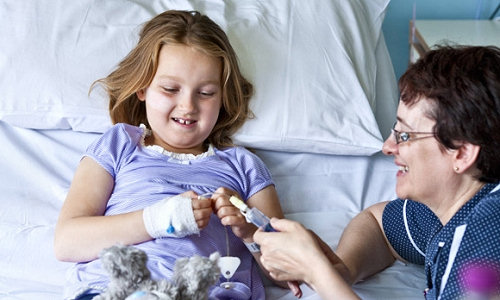A simple blood test* could pinpoint which children are unlikely to respond to treatment for a particularly aggressive form of neuroblastoma, according to a study published in the Journal of Clinical Oncology today.
The researchers – funded by Cancer Research UK and the Neuroblastoma Society – hope the test could help identify up to 20 per cent of children with ‘ultra high-risk’ forms of the disease, whose cancer tends to stop responding to treatment and rarely survive for longer than two years.
Around 100 children are diagnosed with neuroblastoma in the UK each year, usually in children aged five or under. Despite the numbers of children surviving neuroblastoma rising from around 40 per cent in the 1980s to 60 per cent today**, the majority of children have a high-risk form of the disease which is still very hard to treat.
Study leader Professor Sue Burchill, from the School of Medicine at the University of Leeds, said: “The blood test we are developing can help identify children with the most aggressive form of the disease early on, so they can be offered other experimental treatments. This not only gives them the best chance of living longer, but will help speed up the development of much needed new treatments for this group of children.”
Dr Guy Blanchard, a research trustee at The Neuroblastoma Society, said: “This new research shows that simple blood biomarkers can help identify at diagnosis a group of children with stage four neuroblastoma for whom new kinds of treatment are urgently needed.
“Because this study is a collaboration in several European countries the test has a better chance of being adopted more quickly and more widely. “
Lizzy Bremer was diagnosed with neuroblastoma in January 2013 after her parents Alex and Miriam noticed swelling in her stomach and on the side of her head. She was treated with chemotherapy and initially responded well, but scans later showed the cancer had spread. She died a few weeks later.
Her father, Alex, said: “I’ll never forget the first night after she was diagnosed – Miriam and I were curled up in an armchair in the hospital, with every connotation of the diagnosis running through our heads. Your life turns upside down and things will never be the same again.
“When Lizzy started chemotherapy, there was some improvement at first and she even started walking for the first time, but around May, her temperature started to spike and we became increasingly nervous. When the scan results came back, it showed the cancer was rampant and we were transferred to palliative care. She passed away just two days after her second birthday in July – it was a wretched time and it is hard to think back on it coherently.
“Looking back, an early diagnosis of aggressive neuroblastoma is the only thing that could have helped Lizzy. She had months of chemotherapy which wasn’t effective and if we had known she had the aggressive type of the disease, she could have been treated differently in that time. We welcome this research into the blood test, which we hope might help other families in the future.”
Kate Law, Cancer Research UK’s director of clinical research, said: “Being able to spot in advance which children have more aggressive forms of neuroblastoma will help us develop treatments faster and get these children onto clinical trials sooner. Cancer Research UK is funding trials into a number of promising new treatments which we hope will give more options for children with this devastating disease.”
Story Source:
The above story is based on materials provided by Cancer Research UK.





